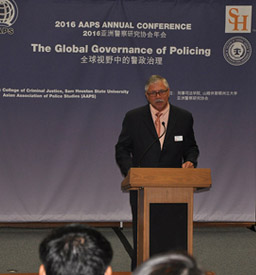This summer, the College of Criminal Justice hosted the 16th Annual Conference of the Asian Association of Police Studies (AAPS), an international organization that advances scientific, practical, and professional knowledge concerning policing and crime control.
This year’s meeting focused on “The Global Governance of Policing: Police, Societies, and Markets” and drew scholars and practitioners from China, Japan, Taiwan, South Korea, the U.S., and Thailand, including several Ph.D. students and graduates from Sam Houston State University (SHSU). The two-day conference featured the latest research on policing issues in Asian communities and the U.S. as well as tours of the Wynne Unit of the Texas Department of Criminal Justice, the Huntsville Police Department, and the Sam Houston statue.
This is the second time that the College of Criminal Justice hosted the event, which was organized by Dr. Jurg Gerber, a SHSU Professor and Director of International Initiatives in the College of Criminal Justice; Amanda Burris, Assistant to the Dean and CJ International Initiatives Program Coordinator; and Kate Angulski, a Ph.D. student. The conference featured plenary sessions with Dr. Phillip Lyons, Dean of the College of Criminal Justice and Director of the Criminal Justice Center, and Dr. Jihong Solomon Zhao, also a Professor at the College.
Dr. Yu-Lan Sandy Yeh of Central Police University in Taiwan serves as Secretary General of the AAPS. She led a delegation from Taiwan and played a prominent role in the proceedings of the conference.
 Dr. Lyons welcomed the distinguished guests, saying the college has a rich history with Asian nations. The College has partnerships with Zhejiang Police College, Shanghai Police College, National Police University of China, Central Police University of Taiwan, China Petroleum University, Southwest University of Political Science and Law in China, and Vietnamese Ministry of Public Security. In the past, the College also had ties with the Royal Thai Police Academy, Dongguk University, Kyonggi University, Korea National Police University, and the Japanese Ministry of Justice.
Dr. Lyons welcomed the distinguished guests, saying the college has a rich history with Asian nations. The College has partnerships with Zhejiang Police College, Shanghai Police College, National Police University of China, Central Police University of Taiwan, China Petroleum University, Southwest University of Political Science and Law in China, and Vietnamese Ministry of Public Security. In the past, the College also had ties with the Royal Thai Police Academy, Dongguk University, Kyonggi University, Korea National Police University, and the Japanese Ministry of Justice.
“Our ties to Asia run quite deep,” said Dr. Lyons. “We have Ph.D. graduates who are from or teach in China, Korea, Taiwan, Thailand, Macau, and the Philippines.”
Dr. Gerber attended last year’s meeting of the AAPS in Hangzhou, China and agreed to host the organization’s 2016 conference in Huntsville. “We plan to organize more conferences focusing on international criminal justice issues,” Dr. Gerber said.
Also, Dr. Ling Ren of the Department of Criminal Justice and Criminology serves as editor of the organization’s journal, Asia Pacific Journal of Police & Criminal Justice.
Dr. Zhao encouraged participants to study the police culture in their community because the vast majority of research in the field focuses on evidence-based policing, with little understanding of the culture and passion that drive police officers. It is important for the Asian community to adopt “their own way of doing research” to investigate the informal organization of policing, since the American model of policing differs significantly from their own.
“Asians have a very distinct culture, and it is very important and can be put in the analysis,” Dr. Zhao said. The conference featured panels on community policing; cooperation and international issues; police perceptions, attitudes and integrity; current and future trends; police administration; and crime and criminology.
Dr. Lyons concluded the conference with a challenge for participants to bring new policing theories from Asia to the next session of the organization to deepen understanding about police and their roles in society.
“We are building a knowledge base of what works and doesn’t work to make us more efficient, more effective, and to enhance safety,” said Dr. Lyons.
